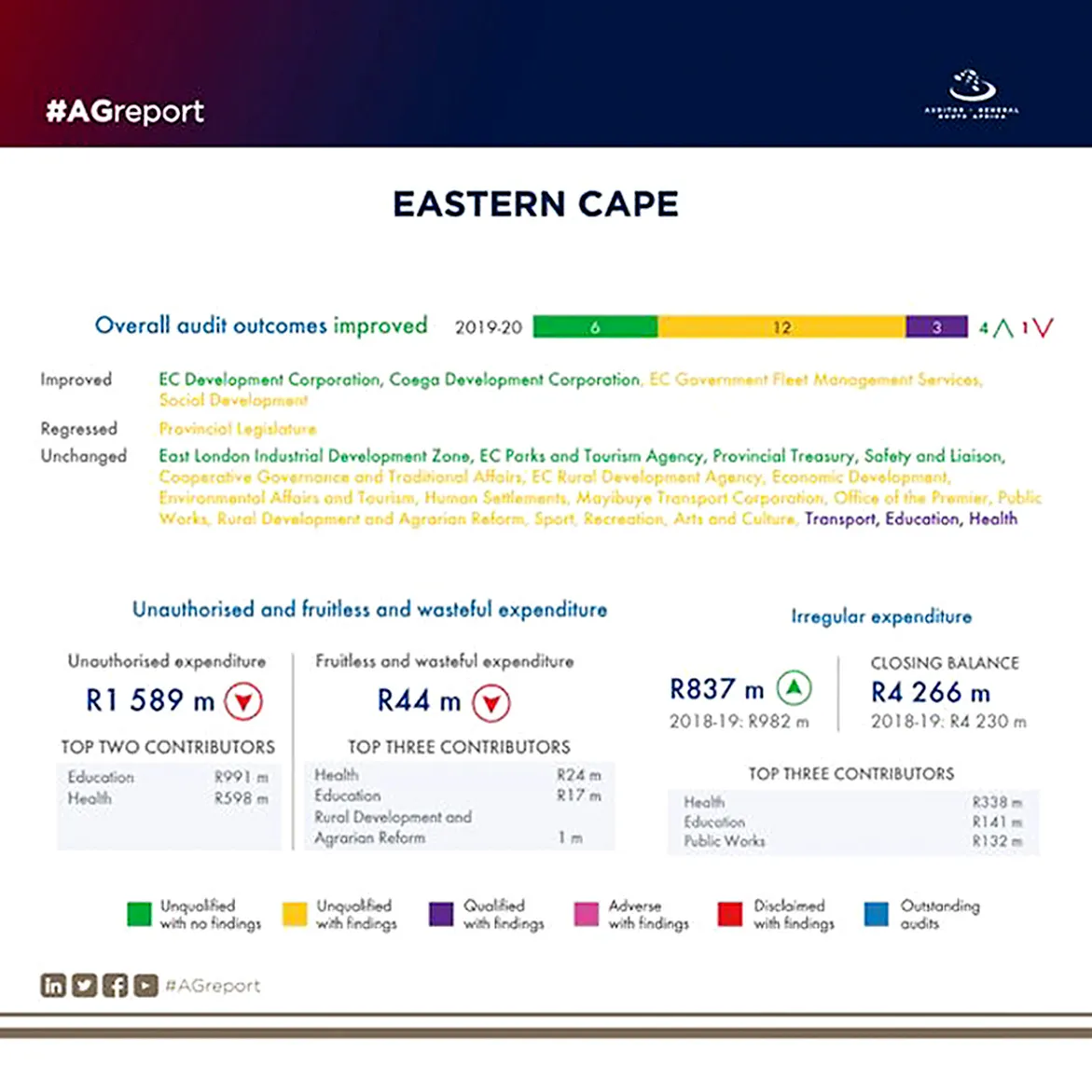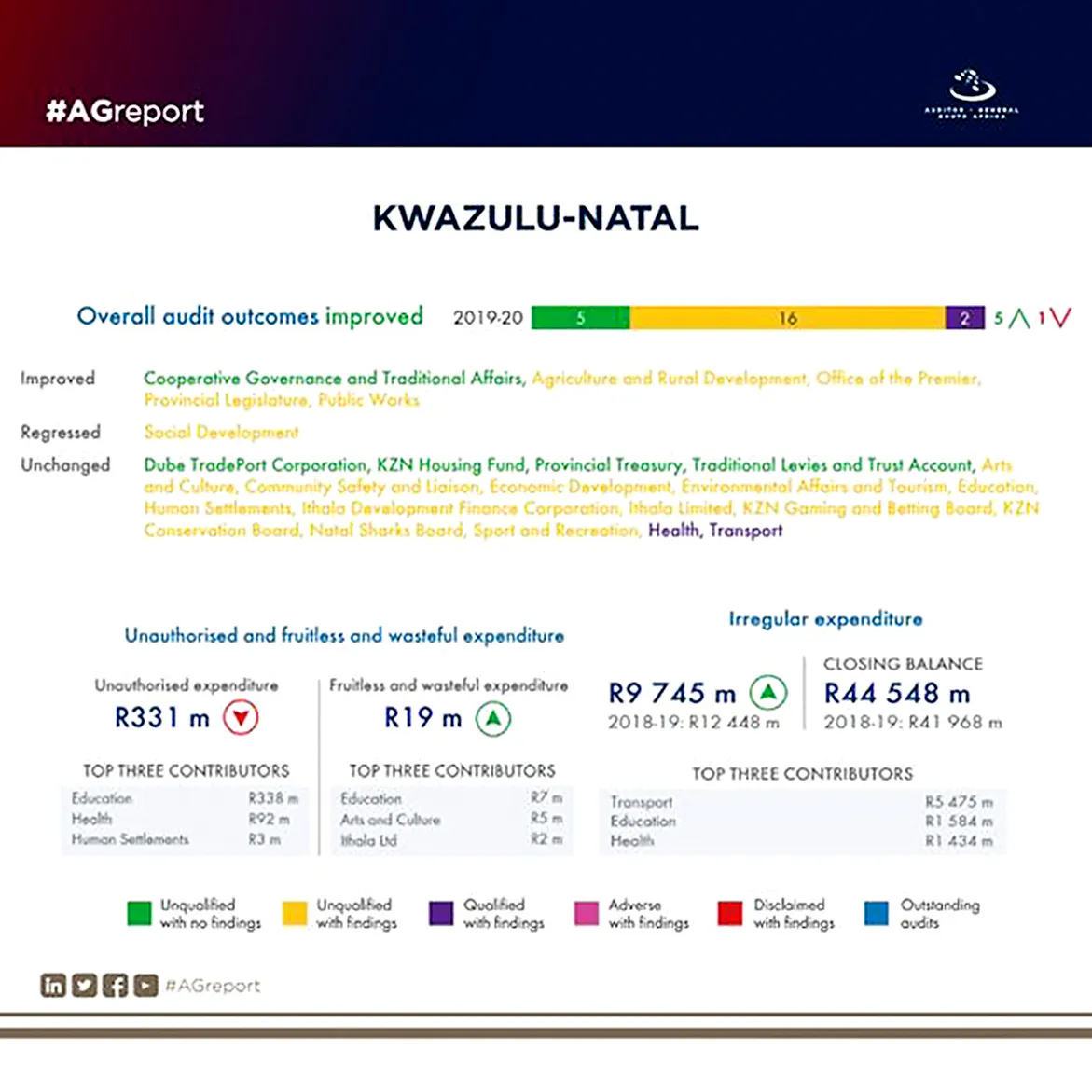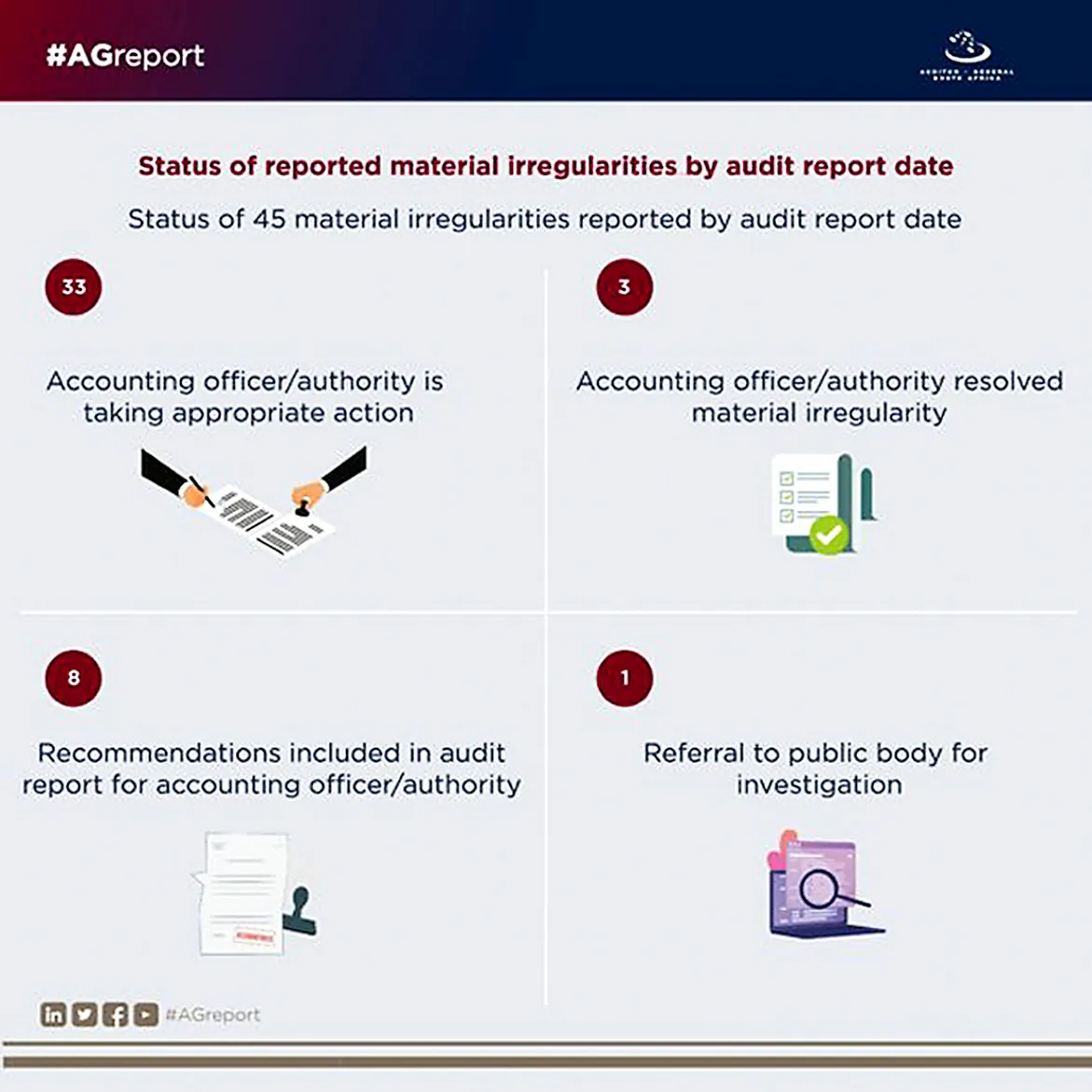The recently released 2019/2020 audit outcomes for national and provincial departments showed some improvements, but for the umpteenth time, it is dwarfed by a very grim picture of persistent wastage, financial mismanagement and little-to-wholly-inadequate consequences for those responsible.
For the second year in a row, the Auditor-General’s choice of words remains broadly the same. Singling out some provincial education and health departments, the Auditor-General said they need urgent intervention “to prevent the collapse of these key service delivery departments”.
Medico-legal claims
One driving force behind this forewarned collapse, especially as it relates to the Achilles’ heel of many provincial health departments – is medico-legal claims.
By the end of the financial year, at least five provincial health departments did not have enough money to settle medico-legal claims, which means “the unpaid claims at year-end made up more than the next year’s entire operational budget”. Among them are the North West and Eastern Cape health departments.
Since these medico-legal claims are not budgeted for, they are paid by taking money earmarked for other services, which then becomes a never-ending cycle of robbing Peter to pay Paul.
The Gauteng health department had unbudgeted medical claims amounting to R23.8-billion, while the KwaZulu-Natal department of health’s medical claims increased from R20.1-billion (2018/19) to R23.4-billion (2019/20).
 Auditor-General of South Africa Tsakani Maluleke. (Photo: AGSA / Spotlight)
Auditor-General of South Africa Tsakani Maluleke. (Photo: AGSA / Spotlight)
Reflecting on the impact of these claims on the KZN health department’s financial well-being, Auditor-General Tsakani Maluleke said: “This indicates that the department is not implementing adequate steps to prevent claims, thus placing possible further pressure on its finances when these claims become payable.”
The AG notes in her report that by the end of the financial year, the Eastern Cape department of health had the highest (R36.75-billion) in unpaid medical claims compared to other provincial and national departments.
 In this regard, Eastern Cape MEC for Finance Mlungisi Mvoko, in his recent budget speech, reached for the Apostle Paul when he quoted from the Bible: “Therefore, I do not run like someone running aimlessly and I do not fight like a boxer beating the air.” Mvoko said it is in “these tough times that we must be effective in all we do and do not waste time beating the air and running aimlessly. We must strengthen our institutions to give them teeth to bite, root out corruption and wastage in government”.
In this regard, Eastern Cape MEC for Finance Mlungisi Mvoko, in his recent budget speech, reached for the Apostle Paul when he quoted from the Bible: “Therefore, I do not run like someone running aimlessly and I do not fight like a boxer beating the air.” Mvoko said it is in “these tough times that we must be effective in all we do and do not waste time beating the air and running aimlessly. We must strengthen our institutions to give them teeth to bite, root out corruption and wastage in government”.
He also said the province had established a specialised litigation unit to manage medico-legal claims, and that R15-million had been budgeted for the state law advisor’s office to deal with such claims against the health department.
In North West, the health department’s outstanding medical negligence claims bill stood at R5,5-billion, which, the AG said, is more than “92% of the department’s budget for the next year”. The AG also said that if settled, these amounts would result in unauthorised expenditure as they had not been budgeted for.
R105-billion in claims
Maluleke said provincial health departments clocked a combined claims total of R105.8-billion – most of which were medico-legal claims.
These health departments, along with certain other government departments, started the new financial year “with part of their budget effectively pre-spent”, with serious implications for service delivery.
“This continuing trend of using the next year’s budget to pay the current year’s expenses and claims had a negative impact on departments’ ability to pay creditors on time and to deliver services,” she said.
Despite this, provincial governments often make big promises creating equally big expectations. For example, in March, the finance MEC in North West, Motlalepula Rosho, gave some lofty undertakings. In her budget speech, Rosho said that about R9-billion will be pumped into the provincial health department’s personnel budget, with about R434-million going towards emergency medical services and R33-million towards planned patient transport.
Rosho did not mention medico-legal claims in her written speech this year or last year.
 On how these claims against government departments negatively affect service delivery, Maluleke used Gauteng as an example.
On how these claims against government departments negatively affect service delivery, Maluleke used Gauteng as an example.
“The Gauteng department of health’s budget for claims in 2019-20 was R2,6-million, but total claims of R501-million were paid out for the year,” she said. That meant the department “transferred savings from other line items within the budget to claims from the state to enable them to pay the R501-million”. This meant key vacant positions were not filled at some hospitals.
Recently, Gauteng health MEC, Dr Nomathemba Mokgethi, in answer to a question in the provincial legislature, confirmed that there are 29 senior positions in the department with acting personnel. Plans to fill these posts are underway, but according to DA MPL, Jack Bloom, it means 10 out of 36 hospitals in the province need to have permanent CEOs appointed. Other crucial positions, such as that of head of department and chief financial officer, which became vacant after the audit process, are still vacant.
“I hope that all the acting positions are speedily filled with competent and ethical people, otherwise the sad pattern of scandal in this department will continue,” Bloom said.
One third lacks required qualifications
The call for competent leadership from Bloom and the AG has been overshadowed by some alarming statistics released by the Minister for Public Service and Administration, Senzo Mchunu. Replying to a parliamentary question, Mchunu said that by February 2021, more than a third (3,301) of the 9,477 senior managers in the public service registered on Persal did not have the required qualifications for the job. In the provinces, most of these were in health departments.
Back in Gauteng, Mokgethi revealed more worrying statistics in answer to another question in the provincial legislature. The number of “serious adverse events” in Gauteng public hospitals has risen from 4,170 in 2019 to 4,701 last year, which goes some way towards explaining the increase in medico-legal claims.
These events increased by 13%, with Tembisa Hospital recording 1,226 such incidents during this period, said Bloom. Serious adverse events, he said, are defined as “an event that results in an unintended harm to the patient by an act of commission or omission rather than by the underlying disease or condition of the patient”.
According to Russel Rensberg, director at the Rural Health Advocacy Project, the rise in medico-legal claims is very concerning. Rensburg said these claims probably date back several years, with many stemming from “poor clinical practice at district hospitals”.
He says it is “problematic that [government] does not make provision for claims, despite them having a good idea of what they will pay in a given financial year”.
“I think we have to improve management of adverse events and associated liability. For example, currently, adverse events are reported at the hospital and referred to various committees, including risk [committees] within the department. If there is a liability, there could be significant savings by settling earlier,” he says.
Zukiswa Kota, programme manager at the Public Service Accountability Monitor (PSAM), is alarmed that the most common claims relate to medical negligence at the provincial level.
“This is staggering in every sense of the word and constitutes an unacceptable loss of public funds,” she said.
“The implications – not only for already limited public budgets and for departments’ ability to meet their constitutional obligations – are dire.”
Stressing the need to get value for money, especially given current fiscal constraints, Maluleke said, the “government cannot afford to lose money because of poor decision-making, neglect or inefficiencies”.
The reality is that billions are lost in unauthorised, fruitless, wasteful and irregular expenditure, and trying to stem this is, as Mvoko puts it, “like a boxer hitting air”.
Unauthorised expenditure
The AG defines unauthorised expenditure as “expenditure that was in excess of the amount budgeted (leading to overspending) or that was not spent in accordance with the purpose for which it was intended”.
The Eastern Cape racked up an unauthorised expenditure of R1.59-billion – the highest of all the provinces in the 2019/20 financial year. The bulk of this unauthorised expenditure was the health department’s overspending its budget by R600-million, which included overspending on district health services, provincial hospital services and central hospital services programmes because of settlement of medical claims not budgeted for.
The North West health department, along with that of the Eastern Cape, was also among the top 10 contributors to unauthorised expenditure in government. The department has overspent its budget by R600-million for filling vacant posts.
 Another top contributor, the KwaZulu-Natal health department, overspent its budget by R90-million. The bulk of this was due to spending on HIV medication as part of district health services.
Another top contributor, the KwaZulu-Natal health department, overspent its budget by R90-million. The bulk of this was due to spending on HIV medication as part of district health services.
In the 2019/20 financial year, KwaZulu-Natal MEC for health, Nomagugu Simelane-Zulu, announced in her budget speech the start of the province’s lost-to-follow-up campaign in a bid to get patients – who were initiated on treatment and then stopped taking their ARVs – back on treatment, which may explain this spending.
In Free State, the health department is also among the top 10 contributors. The department incurred unauthorised expenditure for overspending its budget by R80-million. This related to spending on salaries for medical personnel, especially in EMS services. There was also an increase in spending on laboratory services.
Irregular expenditure
Irregular expenditure, according to the AG, is when money is spent without complying with applicable legislation. In this respect, KwaZulu-Natal clocked the highest irregular expenditure of all the provinces at R9.75-billion.
In her report, the AG flagged “a lack of consequence management” that triggered alarming levels of irregular expenditure.
The KZN health department was among the top 10 departments contributing to the province’s irregular expenditure, with R1,43-billion being spent without following the prescripts of the law.
The bulk of the department’s irregular spending was related to non-compliance with legislation in ongoing multi-year contracts for cleaning services, security and medical waste removal. (Spotlight previously reported on issues with the province’s medical waste contracts.)
Gauteng Health, also among the top 10 contributors to the government’s massive irregular expenditure tally, disclosed an amount of R2.32-billion, of which R1.84-billion was incurred in the 2019/20 financial year.
More than half of this amount related to non-compliance issues in procurement, where the department failed to follow a competitive bidding process relating to, among others, security contracts and outsourcing of nursing staff.
In North West, irregular expenditure that accumulated over the years – and which has not been dealt with – now amounts to R27-billion. The AG particularly bemoaned the high levels of irregular expenditure fuelled by the “culture of non-compliance created by the lack of investigations and consequences against those responsible”.
There has been a little improvement with some irregular contracts being cancelled, but the AG said “the inability of leadership to implement corrective action to ensure that non-compliance is swiftly attended to has seen the provincial department of health once again listed as a top contributor to irregular expenditure, with R9,8-billion”. This, despite the North West’s health department being under administration since 2018.
Recently, the DA in the province echoed this concern over the “inability to implement corrective action” when it slammed the appointment of the new North West health department head, Obakeng Mogale. Mogale is the former head of the province’s public works department. He left after being implicated in a tender scandal in 2014.
Winston Rabotapi, DA MPL in the North West legislature, said in a statement the appointment “signals continued failed attempts to steer the department in the right direction”.
In her budget speech, however, Rosho said the province is taking steps to “professionalise supply chain management (SCM) officials”, with 34 already registered with the Chartered Institute of Purchasing and Supply and 24 new SCM practitioners.
According to Rensburg, poor management practice is another significant challenge for government departments.
“Management is essentially planning, organising and controls, but all appear weak or are poorly applied.”
However, referring to the Eastern Cape as an example, Rensberg said, “I do appreciate the challenges of managing in the public sector. The recent decision by the premier of the Eastern Cape to extend the contracts of 8,000 community health workers and nurses will have an impact on the available budget.
“The added expenditure will have to be moved from other areas, resulting in some activities that will be delayed or deferred.
“In my opinion, this political decision will lead to irregular expenditure and officials, and the accounting officer will have to carry the can.”
According to Kirsten Pearson, project specialist at CorruptionWatch and member of the Budget Justice Coalition, these worrying spending patterns show that “it is definitely key not only how much is budgeted, but also how the available funds are spent”.
“It is time that departments actually start implementing the recommendations that the Auditor-General makes year after year after year. Officials who fail to act on the recommendations must be held to account.”
Material irregularities
Not all of these types of expenditure are necessarily linked to corruption. With material irregularities identified, however, it provides important alarm bells for serious financial losses or the potential misuse of public resources.
The AG defines material irregularity as “any non-compliance with, or contravention of, legislation, fraud, theft or a breach of a fiduciary duty identified during an audit performed under the Public Audit Act that resulted in, or is likely to result in, a material financial loss, the misuse or loss of a material public resource or substantial harm to a public sector institution”.
 She also provided some shocking examples of material irregularities, especially in health departments, that have led to or can lead to huge financial losses. Some of these irregularities are being addressed, she said.
She also provided some shocking examples of material irregularities, especially in health departments, that have led to or can lead to huge financial losses. Some of these irregularities are being addressed, she said.
In the Northern Cape, the health department for four years (since 2015) overpaid for radiology services due “to a mathematical error”. The department also recorded payments for mammogram services, but the relevant hospital did not even have a mammogram machine. The financial loss is yet to be quantified by the accounting officer.
According to Maluleke, the then accounting officer did a “preliminary investigation, which resulted in a full-scale investigation instituted in August 2019”. With the change in health HOD’s in North West, however, the investigation was delayed, but the new accounting officer (currently Dr Dion Theys) undertook to kickstart the investigation and consult with the Hawks.
In another case, the National Treasury will now investigate a three-year medical waste contract the department awarded in 2018. According to the AG, the contract was awarded to a supplier “based on criteria applied in the evaluation process, which were different from those in the original bidding invitation” and this non-compliance may likely result in “material financial loss”.
The accounting officer disagreed, and the case was referred to the National Treasury. The extent of the financial loss will be established in the investigation.
In Limpopo, the health department recouped the financial loss suffered after it paid R2.6-million to lease radiology equipment at Pietersburg Hospital that could not be used because it was not licensed for use due to safety concerns. The HOD addressed the concerns and re-launched the licensing of the equipment.
“Following an investigation, the supplier agreed last year to equip the department (from September 2020) at no cost for 24 months.”
Maluleke hailed this as a positive example where accounting officers acted and prevented losses.
At least some of the time, there are consequences for errant officials. In one case in Gauteng, disciplinary action was instituted against two officials implicated in the procurement of IT infrastructure. The case has been referred to the National Prosecuting Authority, and the two may face criminal charges. The state attorney may also institute civil claims against the officials.
The IT contract in question was awarded “without inviting competitive bids” and the department incurred a R148.9-million loss because there were cheaper alternatives.
Are the AG’s new powers helping?
Amendments to the Public Audit Act that came into effect in 2019 gave the AG’s office some much-needed powers to act in the case of such material irregularities.
Among these powers are referring the matter to other institutions such as the police or the Special Investigations Unit. The AG can also make recommendations to the accounting officers (HODs) on how they can correct the material irregularity, and should they fail to do this within a specified time, the AG can instruct the accounting officer to quantify and recoup the financial loss suffered. Should they fail again, the AG can issue certificates of debt in the name of the accounting officer who will be personally liable for the financial losses suffered.
Maluleke said her office will not hesitate, where necessary, to issue certificates of debt. She said the AG’s office has not yet issued any certificates of debt and stressed that the added powers should not be seen as a punitive measure, but rather a means to give accounting officers the opportunity to correct the irregularity and improve accountability. At least three of these material irregularities have been resolved, with the rest being addressed.
Responding to claims that the process may be too cumbersome, Pearson acknowledged that it may be “somewhat time-consuming, however, there should be some consideration for the fact that the AG has been implementing these new powers in a manner that allows officials who have a duty to follow up on financial losses by instituting investigations to get to grips with what is expected”.
“The initial time spent on this change process should start to show benefits when we see financial losses being recovered and officials who caused them facing consequences.
“It will really reap benefits if, in the future, it leads to an accountability culture that sees financial losses being avoided before they occur. It will be far less time-consuming if corruption is prevented before it happens,” she said.
Rensberg said it may be too soon to tell, “as the reforms are only beginning to be implemented”.
“But I think it is a step in the right direction. Material irregularity places a spotlight on supply chain management and in some ways will protect accounting officers from political influence.”
According to Kota, international research shows that collaboration between supreme audit institutions such as the Auditor-General’s office and civic actors such as the media and civil society organisations has the potential to bridge the challenges related to time and capacity.
“The AG has already shown the benefits of such partnerships in the work achieved in the first and second Covid-19 special audits. So perhaps this is worth institutionalising,” she said.
A ‘weak’ accountability chain
Besides the AG, there are many other levers responsible for accountability and oversight over government spending and performance. These include audit committees of departments, the portfolio committees, especially Scopa in Parliament and provincial legislatures, national and provincial treasuries and civil society.
Maluleke called on these role-players “as well as the political and administrative leadership to play their part effectively and without fear or favour to ensure accountability for government spending”.
Kota said recent developments show that the amendments to the Public Audit Act are already reaping benefits for the public purse.
“But,” she said, “the broader challenges relate to strengthening the entire accountability ecosystem. The PSAM characterises this as involving role-players like public accounts committees, provincial portfolio committees for health, law enforcement, civic actors, the public (who are at the receiving end of dwindling services), and the private sector.
“Without all those actors working towards effecting change, audit resolutions and sanctions are limited,” said Kota.
“Regrettably, weaknesses are evident throughout South Africa’s public resource management chain. Some, as the Commission on State Capture has shown us, are intentional. Others emerge as a result of an inability to ensure a reform agenda that meets the demands of a growing democracy.
“There is an impressive wealth of credible evidence that has been developed to understand how to ‘fix’ the system. The political and administrative failure to institute these changes continues to hamstring South Africa’s development in ways that are defeatist at best,” she said.
According to Rensberg, the “common denominator across all these levers is the governing party and its own governance”. “We elect political parties, not individuals. So, elected officials are accountable to the party that nominated them. So if you want to improve accountability, we must reform the governance of political parties,” he argued.
Pearson also bemoaned weak oversight. “Despite a wide range of institutions having oversight roles, there is weak oversight and a culture of rigid mandate adherence. With this type of lax oversight, corruption proliferates.
“Watchdog institutions have been weakened and are asleep on the job. They need to wake up and act to ensure that controls are strengthened in departments, municipalities and entities,” she said.
The undercurrent of politics
According to Kota, there are four risk areas highlighted in the audit report outcomes that are worth serious attention. “Procurement, planning, parastatals and (linked to it all) politics.”
Rensberg also considers politics as an important undercurrent.
“Many of the issues are in the poor management of supply chain processes. This is an area where accounting officers may face the biggest challenges, as it is the area where political influence is at its strongest,” he said.
During the briefing, Maluleke acknowledged that political pressure on accounting officers contributed to bad audit outcomes.
“The Public Finance Management Act talks about the accounting officer, not the politician. I am hoping that [the Public Audit Act] amendment will service to inspire accounting officers to lean into the powers they have by design, and not give in to inappropriate pressure,” City Press quoted Maluleke as saying. DM
Read the full AG report here.
This article was produced by Spotlight – health journalism in the public interest.




 Auditor-General of South Africa Tsakani Maluleke. (Photo: AGSA / Spotlight)
Auditor-General of South Africa Tsakani Maluleke. (Photo: AGSA / Spotlight) 